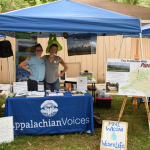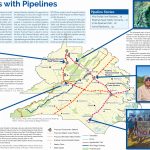
This is the last day of my internship with Appalachian Voices. But even though my formal time here is over, I plan to continue fighting for clean water.

This is the last day of my internship with Appalachian Voices. But even though my formal time here is over, I plan to continue fighting for clean water.

Contact: Gabby Brown, Sierra Club, gabby.brown@sierraclub.org Peter Anderson, Appalachian Voices, peter@appvoices.org, 434-293-6373 Richmond, VA — Environmental groups filed suit today challenging West Virginia’s certification for the proposed Mountain Valley Pipeline, which would transport fracked gas across West Virginia and Virginia.…

In a classic “fake news” move, Dominion Resources execs held a tele-press conference yesterday where they basically said the Atlantic Coast Pipeline is a done deal. But at least 25,000 people across W.Va., Va. and N.C. are demanding answers, such as: Is this pipeline even needed?

Expansion of the natural gas infrastructure through constructions such as the Atlantic Coast and Mountain Valley Pipelines carry significant risks to the environment and communities near them. But they also carry significant financial benefits for the companies that build them, which may help explain the rush to build more and more pipelines.
As more and more pipeline projects are proposed to bring fracked gas out of the Appalachian Basin, residents are rising up to voice their opposition and fight to stop the pipelines from endangering their communities.

Both the Atlantic Coast and Mountain Valley Pipelines threaten to damage historic and scenic sites along their paths through West Virginia, Virginia and North Carolina. Places such as Bent Mountain and Peters Mountain could be permanently scared, while parts of the Appalachian Trail and the Blue Ridge Parkway could also be impacted.

This map shows a sampling of the types of sites that would be affected by the proposed Mountain Valley Pipeline and Atlantic Coast Pipeline. View the print centerspread here while we transfer it to a web-friendly version.
While both the Pipeline and Hazardous Materials Safety Administration and industry groups say pipelines are the safest way to transport products like natural gas, pipeline incidents are on the rise.
Contacts: Lewis Freeman, Allegheny-Blue Ridge Alliance, 703-298-8107, lewfreeman@gmail.com Greg Buppert, Southern Environmental Law Center, 434-977-4090, gbuppert@selcva.org Ben Luckett, Appalachian Mountain Advocates, 404-645-0125, bluckett@appalmad.org Peter Anderson, Appalachian Voices, 434-293-6373, peter@appvoices.org An analysis of environmental impacts for the proposed Atlantic Coast Pipeline…